14 Proficiency Interviews 1: Rooms of the House, Comparative, Superlative
PI-1: Proficiency Interview
Rooms of the House, Comparative, Superlative
In Chapter 4, you learned words relating to rooms of the house. In this section, you will review them along with the accusative case. The accusative case is used for direct objects and after the following prepositions: durch, für, gegen, ohne, um, bis. The masculine definite or indefinite article will add an –n.
Ich habe ein Bett, einen Sessel und eine Lampe.
(Sessel is masculine and adds the extra -n to the indefinite article.)
Ex. A: Was haben Sie in Ihrem Zimmer? What do you have in your room? Review the accusative case by describing the items in your room. Use the picture below to help.
Ich habe ein/eine/einen ___________ in meinem Zimmer.
Es gibt ein/eine/einen ____________ in meinem Zimmer.
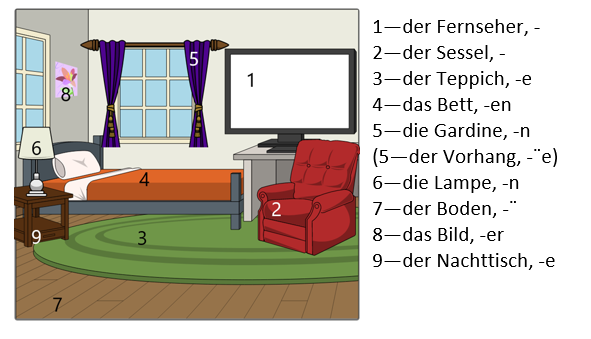
Ex. B: Was gibt es bei Ihnen zu Hause? What else do you have at home? Use the picture below for suggestions.
Ich habe ein/eine/einen ________ bei mir zu Hause.
Es gibt ein/eine/einen _________ bei mir zu Hause.
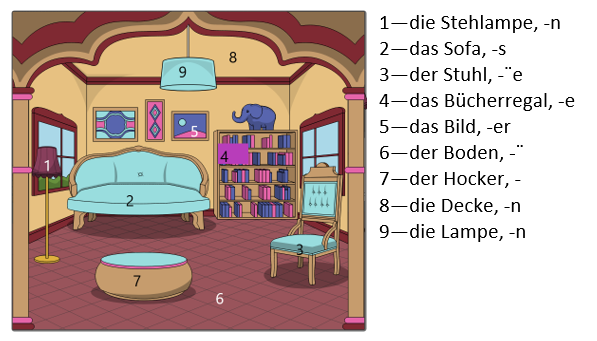
Ex. C: Haben Sie eine Küche? Sprechen Sie mit Ihren Mitstudenten und stellen Sie Fragen.
A: Hast du einen Kühlschrank?
B: Ja, ich habe einen Kühlschrank.
ODER
B: Nein, ich habe keinen Kühlschrank.

Ex. D: Beschreiben Sie Ihre Küche! Go one step further and describe the items in your kitchen.
Mein Kühlschrank ist alt (neu, hässlich, modern…usw.)
Want more words to describe your house? Check out Claudia Kost’s and Crystal Sawatzky’s (University of Alberta) presentations to hear audio clips of more house vocabulary.
EXTRA PRACTICE with House Vocabulary: (Courtesy of Claudia Kost & Crystal Sawatzky, University of Alberta.)
Ex. E: Nicos Weg. Episode 52: Wie viel Mehl? Watch the episode and do the online activities. You will learn some words about cooking.
https://learngerman.dw.com/en/wie-viel-mehl/l-37647289
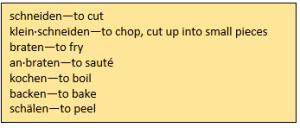
Ex. F: Kochen.
- Kochen Sie gern? Kochen Sie nicht gern? Was kochen Sie? Wie oft?
- Beschreiben Sie Ihr Lieblingsgericht! Wie bereiten Sie dieses Gericht zu? Beschreiben Sie jeden Schritt.
- Wann haben Sie zum letzten Mal gekocht? Was haben Sie gekocht? Für wen haben Sie gekocht? Erläutern Sie!

More Adjectives: Opposites! Students are always forgetting adjectives or finding they don’t know ones they need to use. Try this activity to learn a few more adjectives before we do comparative and superlative. (Courtesy of Claudia Kost & Crystal Sawatzky, University of Alberta.)
Comparative and superlative
We can take it one step further and compare people and items to others with the comparative. In English, we form the comparative by adding –er to the end of an adjective.
- big→bigger
- tall→taller
- short→shorter
- ugly→uglier
The good news is that we do the exact same thing in German.
- klein→kleiner
- nett→netter
- reich→reicher
- freundlich→freundlicher
- modern→moderner
In order to compare two items, use the word als—than.
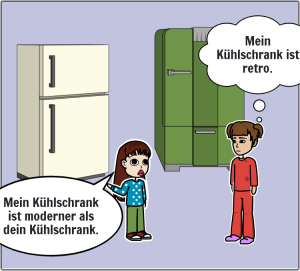
- Mein Freund ist netter als dein Freund.
- Ein Auto fährt schneller als ein Fahrrad.
- Die Sonne scheint heller als der Mond.
HOW TO FORM COMPARATIVE: add –er to the adjective + als
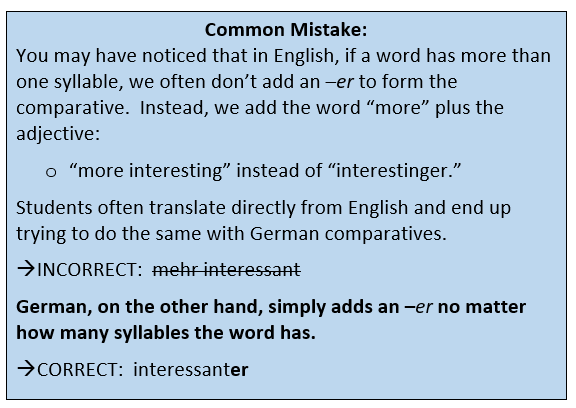
Ex. A: Vergleichen Sie. Verwenden Sie den Komparativ. Compare the following items. Feel free to agree or disagree with your classmates.
Beispiel: McDonald’s/Burger King (billig)
→McDonald’s ist billiger als Burger King.
ODER
→Burger King ist billiger als McDonald’s.
- Coca-Cola/Pepsi (lecker)
- Herr der Ringe/Harry Potter (interessant)
- die Universität/die Schule (einfach)
- ein Bett/ein Sofa (bequem)
- das Auto/das Fahrrad (schnell)
- das Flugzeug/das Pferd (altmodisch)
- Star Wars/Star Trek (kreativ)
- Katzen/Hunde (clever)
- ich/du (sarkastisch)
More Comparatives: Some adjectives add an Umlaut when forming the comparative.
How to recognize these:
- usually very short
- usually one syllable
- only add the Umlaut if there is an “umlautable” vowel (a, o, u)
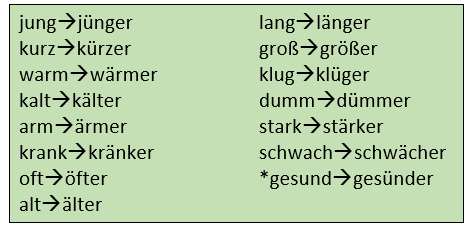
Quick Listening: Listen to Viola, AudioLingua, describe her family. Which comparative do you hear that adds an Umlaut?
Ex. B: Vergleichen wir! Bauen Sie Sätze.
Beispiel: 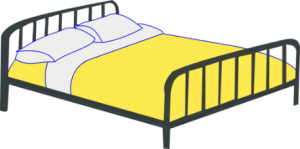

→Das gelbe Bett ist größer als das grüne Bett.
→Das grüne Bett ist kleiner als das gelbe Bett.
→Das erste Bett ist teurer als das zweite Bett.
→Das zweite Bett ist kürzer als das erste Bett…usw.
EXTRA PRACTICE: Go to Germanzone.org’s website to do some extra practice with comparatives.
https://www.germanzone.org/comparative-adjectives-adverbs-1-situationen/
Deutsche Musik. Listen to Glasperlenspiel’s song, Herz aus Gold (2013), to hear several examples of comparatives.
Liedertext: https://www.songtexte.com/songtext/glasperlenspiel/herz-aus-gold-63a9f28b.html
Comparing Equal Things:
You can also compare things that are equal to each other.
- Star Wars is as good as Star Trek.
- Burger King is as cheap as McDonald’s.
In German, to express “as (adjective) as,” you will use the following:
→so (Adjektiv) wie
- Star Wars ist so gut wie Star Trek.
- Burger King ist so billig wie McDonald’s.
If you want to emphasize it, you can add the word genau, “exactly,” to this formula:
- Star Wars ist genauso gut wie Star Trek.
- Burger King ist genauso billig wie McDonald’s.
Similarly, if you want to say that something is NOT comparable, all you have to do is stick a nicht in front of the expression.
- Star Wars ist nicht so gut wie Star Trek.
- Burger King ist nicht so billig wie McDonald’s.
Ex. C: Debatte. Sprechen Sie mit Ihren Mitstudenten über die folgenden Themen. Drücken Sie Ihre Meinung aus.
![]()
Beispiel: Pizza/Sushi/Salat
A: Ich denke, Pizza ist leckerer als Salat.
B: Ja, aber Salat ist gesünder als Pizza…und Sushi ist genauso gesund wie Pizza.
A: Nein, Salat ist nicht unbedingt gesund. Salatsoße hat zu viel Fett…usw.
- Cola/Dr. Pepper/Wasser
- Krimis/Zeichentrickfilme/die Nachrichten
- das Auto/das Fahrrad/das Flugzeug
- Turnschuhe/Badelatschen/Stiefel
- Katzen/Hunde/Vögel
- das Bett/das Sofa/der Sessel
- der See/die Ozean/das Meer
- die Berge/der Strand/zu Hause
- das Haus/die Wohnung/das Schloss
Superlative:
So far, you have compared one item to another with the comparative. If you want express the superlative in English, we add –est to the end of the word.
This student is the shortest.
My brother is the dumbest.
His personality is the most boring.
In German, the superlative is very similar to English.
Diese Studentin ist am kleinsten.
Mein Bruder ist am dümmsten.
Seine Persönlichkeit ist am langweiligsten.
Note these differences:
- The superlative form must have am in front of the adjective→am ärmsten
- The suffix –sten will be at the end of the adjective→am ärmsten.
- Any short, common, one-syllable adjectives that added an Umlaut for the comparative will also do so for the superlative.
If the adjective ends with the following sounds, it usually adds –esten to make it pronounceable: -d, -t, -s, -ß, -z.
- kurz→ kürzer→ am kürzesten
- o Otherwise, you would end up with too many consonants together→
am kürzsten. It is difficult to pronounce z and s
- o Otherwise, you would end up with too many consonants together→
- weit→ weiter→ am weitesten
- o Otherwise, you would end up with
am weitsten. It is hard to pronounce the –tst– together.
- o Otherwise, you would end up with
- weiß→ weißer→ am weißesten
- o Otherwise, you would end up with three of the letter s together, a bit too many—
am weisssten.
- o Otherwise, you would end up with three of the letter s together, a bit too many—
Listen to Silbermond’s song Wenn’s am schönsten ist (2023) to hear examples of the superlative.
Ex. D: Familienmitglieder. Vergleichen Sie Ihre Familienmitglieder. Wer ist am ältesten? Wer ist am größten? Wer ist am jüngsten? Wer ist am kleinsten? Wer ist am nettesten?…usw.
Ex. E: Superlativ. Go back to Ex. C and use the superlative to express your opinion about the items.
Ex. F: Vergleichen Sie zwei Freunde. Verwenden Sie dabei den Komparativ und den Superlativ. Schreiben Sie mindestens 10 Sätze.
Irregular Comparatives and Superlatives:
Some comparatives and superlatives are irregular; they exist in English as well.
good→better→best
(After all, it would be incorrect to say, good/gooder/goodest.)
German also has a handful that are irregular. Fortunately, several of them are also irregular in English.

QUICK LISTENING: Listen to Matteo from AudioLingua describe Austrian specialties. You will hear the irregular superlative “am liebsten.”


Ex. G: Gespräche. Vergleichen Sie die folgenden Themen.
- das Wetter am Samstag/das Wetter am Sonntag/das
- Wetter heute
- Amerika/Kanada/England
- tausend Dollar/tausend Euro/tausend Rubel
- ein Haus/ein Turm/ein Berg
- ein Vogel/ein Flugzeug/ein Raumschiff
- Basketball/Tennis/Golf
- mein Auto/mein Haus/mein Rucksack
EXTRA PRACTICE with Comparative: (Courtesy of Claudia Kost & Crystal Sawatzky, University of Alberta).
Ex. H: Berufe. Besprechen Sie die folgenden Berufe. Wer verdient am meisten? Am wenigsten? Wer muss mehr arbeiten? Weniger arbeiten? Welchen Beruf finden Sie am besten? Warum?
- der Elektriker/die Elektrikerin
- der Bankkaufmann/die Bankkauffrau
- der Chef/die Chefin
- der Koch/die Köchin
- der Friseur/die Friseuse
- der Kellner/die Kellnerin
- der Polizist/die Polizistin
- der Anwalt/die Anwältin
- der Professor/die Professorin
- der Lehrer/die Lehrerin
- der Bäcker/die Bäckerin
- der Automechaniker/die Automechanikerin
EXTRA PRACTICE: Go to Germanzone.org’s website to do some extra practice with comparative and superlative.
- https://www.germanzone.org/degrees-adjectives-adverbs/
- https://www.germanzone.org/comparative-adjectives-adverbs-2/
- https://www.germanzone.org/comparative-adjectives-adverbs-3/
- https://www.germanzone.org/superlative-adjectives-adverbs-3/
Ex. I: Nicos Weg: Episode 53: Wie war dein Urlaub? Watch the video and do the activities.
https://learngerman.dw.com/en/wie-war-dein-urlaub/l-37648534
Ex. J: Reisen.
- Wohin reisen Sie? Wie oft?
- Wie lange bleiben Sie und was machen Sie dort?
- Mit wem reisen Sie?
- Beschreiben Sie eine Reise, die Sie gemacht haben. Was haben Sie dort gemacht? Mit wem sind Sie gereist?
- Welche Reisepläne haben Sie? Was werden Sie dort machen? Mit wem werden Sie reisen? Erläutern Sie!














